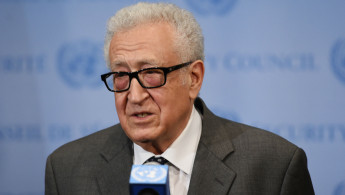Veteran Arab UN diplomat: West responsible for Islamic State
Algeria's former peace envoy Lakhdar Brahimi has blamed the US for the rise of the Islamic State group (IS) - saying we now "all suffer the consequences".
Brahimi, who remains one of his country's most influential global figures, launched the outspoken attack at the prominent Fikra (Idea) Conference in Algiers.
Referring to ongoing acts of barbarity by Islamic State (IS) terrorists, he said: "Muslim majority countries have to ask themselves what leads to terrorism, and to try to find a solution to the problem."
Western governments, and the United States in particular, are responsible for the rise of IS, he said.
US should re-examine its badly flawed "war on terror". Read more. |
He added that "There is no doubt that the original sin which led to the emergence of IS is the US-led invasion of Iraq. There was no justification for the war in Iraq, and we all suffer the consequences."
Brahimi continued: "The IS will be defeated - not just through bombardment from the air, but through a political process in Iraq, Syria and Libya which is now at the forefront of the new War on Terror."
The former United Nations and Arab League peace envoy also called for Algeria to play a greater role in defeating the IS.
A call for increased engagement
| There was no justification for the war in Iraq, and we all suffer the consequences. - Lakhdar Brahimi |
Going against the grain of his country's famously non-interventionist foreign policy, Brahimi said: "Algeria has a role to play in North Africa and especially toward Libya."
He said "The Libyan people are our neighbours and Algeria has a moral responsibility to help end the violence in the country."
The IS produced a deeply disturbing video of Egyptian Christian workers being beheaded in Libya last week.
The former Algerian diplomat addressed the Fikra Conference about the difficulty of his UN peace missions to countries such Afghanistan, Iraq, Lebanon, and Syria.
Brahimi stepped down from his role in Damascus last year, after he failed to find a peaceful solution to the Syrian civil war, which has now claimed some 220,000 lives.
His resignation was largely prompted by frustration at Syrian President Bashar al-Assad's plans to hold an election last June.
Addressing the media at the UN, Brahimi expressed his regrets saying: "Apologies once more that we haven't been able to help [the Syrian people] as much as they deserve, as much as we should have, and also to tell them that the tragedy in their country should be solved... they have shown incredible resilience and dignity."
Back at the Fikra conference in Algiers at the weekend which focused on inspiring young people to succeed and was attended by 1500 people and broadcast live to universities, Brahimi said: "I believe that international interest in Syria is coming back, but the responsibility to sort out the problem lies mainly in the region."
He added "The break-up of Syria is in nobody's interest and it is to be feared that this is a possibility. That's why it is hugely important that the regional powers wake up and do something about it."
Brahimi said the violence in both Iraq and Syria was "a catastrophe that concerns us all in the region and in the world."
A regional cataclysm
Speaking about the cataclysmic situation in Syria, Brahimi said: "The Syrian people are deeply unhappy and they do not deserve what is happening to them."
He added "Syria is a particularly desperate case and the UN has a responsibility there. The Syrian government has not changed its initial position."
| The IS will be defeated - not just through airstrikes, but through a political process in Iraq, Syria and Libya. - Lakhdar Brahimi. |
As far as the Syrian government was concerned, what was happening in Syria was a foreign conspiracy, he said, adding that there were now more than 1200 armed groups in the country.
"There is certainly external interference in Syria from both neighbouring countries and great powers who have interests to protect," he said.
Brahimi said Syrians were "first and foremost the victims of a family government that has been in place for more than 40 years and are also the victims of foreign interference."
In regards to the United Nations - which is being asked by Libya to lift an arms embargo - Brahimi said: "There is no doubt that the role of the UN needs to be strengthened."
Referring to the Elders, an independent group of global leaders working together for peace and human rights, Brahimi added: "During a meeting of the Elders in Munich last week, I called for the UN and the Security Council to be reformed. It is a necessary reform... The UN is an indispensable body but sometimes unsatisfactory."


![President Pezeshkian has denounced Israel's attacks on Lebanon [Getty]](/sites/default/files/styles/image_684x385/public/2173482924.jpeg?h=a5f2f23a&itok=q3evVtko)



 Follow the Middle East's top stories in English at The New Arab on Google News
Follow the Middle East's top stories in English at The New Arab on Google News


